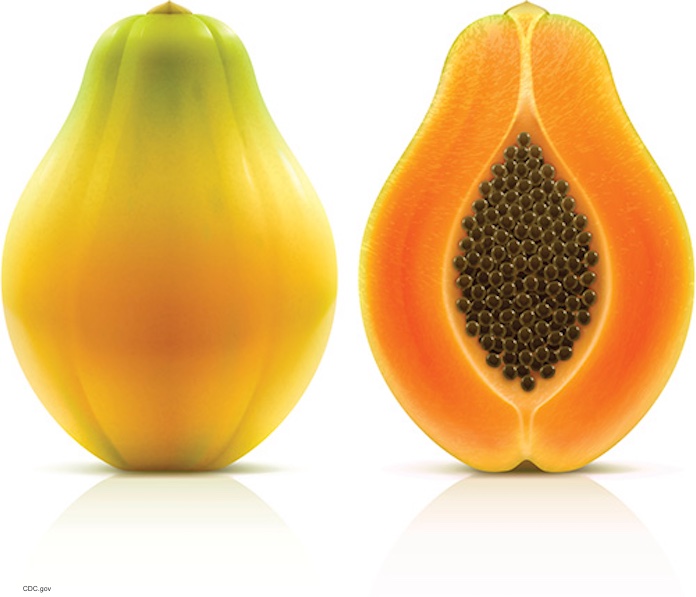The multistate Salmonella outbreak linked to recalled imported Maradol papayas is now over, according to the FDA. A total of 251 people were infected with the outbreak strains of outbreak strains of Salmonella Thompson (144), Kiambu (54), Anatum (20), Agona (12), Gaminara (7), Urbana (7), Newport & Infantis (4), and Senftenberg (3), from 25 states. Seventy-nine ill people were hospitalized. Two deaths were reported, one from New York City and one in California.

The FDA began investigating the first outbreak, which was the largest, on March 17, 2017. Three other outbreaks were eventually identified and added to the total.
Eventually, four brands of Maradol papayas were recalled that were imported from four farms. The brands were Caribeña brand, distributed by Grande Produce; certain Cavi brand papayas distributed by Agroson’s; Valery brand papayas, distributed by Freshtex Produce, LLC; and Frutas Selectas brand papayas, distributed by Bravo Produce. Those papayas were grown on these farms in Mexico: Carica de Campeche in Tenabo, Campeche; Rancho El Ganadero in Colima, El Zapotanito in La Huerta, Jalisco, and Productores y Exportadores de Carica Papaya de Tecomán y Costa Alegre, Tijuana, Baja California. Increased testing found papayas from three other farms that were positive for Salmonella strains that match illnesses not related to this outbreak.
The Caribeña brand were sold between July 10 and 19, 2017. The Cavi brand were available until July 31, 2017. The Valley brand was distributed between July 10 and 13, 2017. And the Fructus Selects brand was distributed between August 10 and 29, 2017.

Attorney Fred Pritzker, who has represented clients sickened with Salmonella infections, said, “Even when you recover from this infection, there is still a risk you will develop a serious complication in the future.” Call 1-888-377-8900.
Attorney Fred Pritzker said, “No one should get sick just because they decided to eat a papaya. The hospitalization rate in this outbreak was quite high, which may indicate that the strains were especially virulent.”
If you have any of these papayas in your home, they should be immediately thrown away in a sealed container so other people or animals can’t eat them. If you aren’t sure whether or not you purchased these particular papayas, ask your retailer. The FDA added firms whose papayas test positive for the outbreak strains of Salmonella to an import alert.
Overall, there were 251 people were infected with the outbreak strains of Salmonella from 25 states. Seventy-nine ill people were hospitalized. Two deaths were reported, one from New York City and one in California.
Papayas imported from Mexico have been screened at the border for Salmonella by third-party laboratories since 2011. During this outbreak, the FDA increased testing. They found that papayas from Caraveo Produce were contaminated with Salmonella Infantis and Newport that were matched to one sick person in the U.S., and that papayas from El Zapotanito had sickened seven people. In both cases, evidence obtained by the FDA showed that no shipments imported by those companies were on the market because they were past their shelf life.
This investigation and these outbreaks occurred during the past year. The CDC and FDA started investigating in June, and the recalls were issued in July 2017.
The symptoms of a Salmonella infection include diarrhea that may be bloody, fever, vomiting, and abdominal cramps. These symptoms usually appear 12 to 72 hours after exposure to the bacteria. Most people get better without medical treatment, but some can develop dehydration or sepsis and need to be hospitalized. The hospitalization rate for this outbreak was 31.5%, which is higher than the typical rate of 20% for most Salmonella outbreaks.
If you ate imported papayas in the last few months and have experienced these symptoms, it’s important to visit your doctor. Salmonella infections can have long term health consequences that could be serious, including Reiter’s Syndrome, irritable bowel syndrome, and high blood pressure.
Pritzker Hageman law firm helps people sickened by food contaminated with Salmonella and other pathogenic bacteria get answers, compensation and justice. We protect our client’s legal rights. Our lawyers represent client and families of children in personal injury and wrongful death lawsuits against growers, importers, grocery stores, food producers, shippers, dairies, restaurants, retailers, and schools. Attorney Fred Pritzker recently won $7.5 million for young client whose kidneys failed after he developed hemolytic uremic syndrome because of an E. coli infection.




